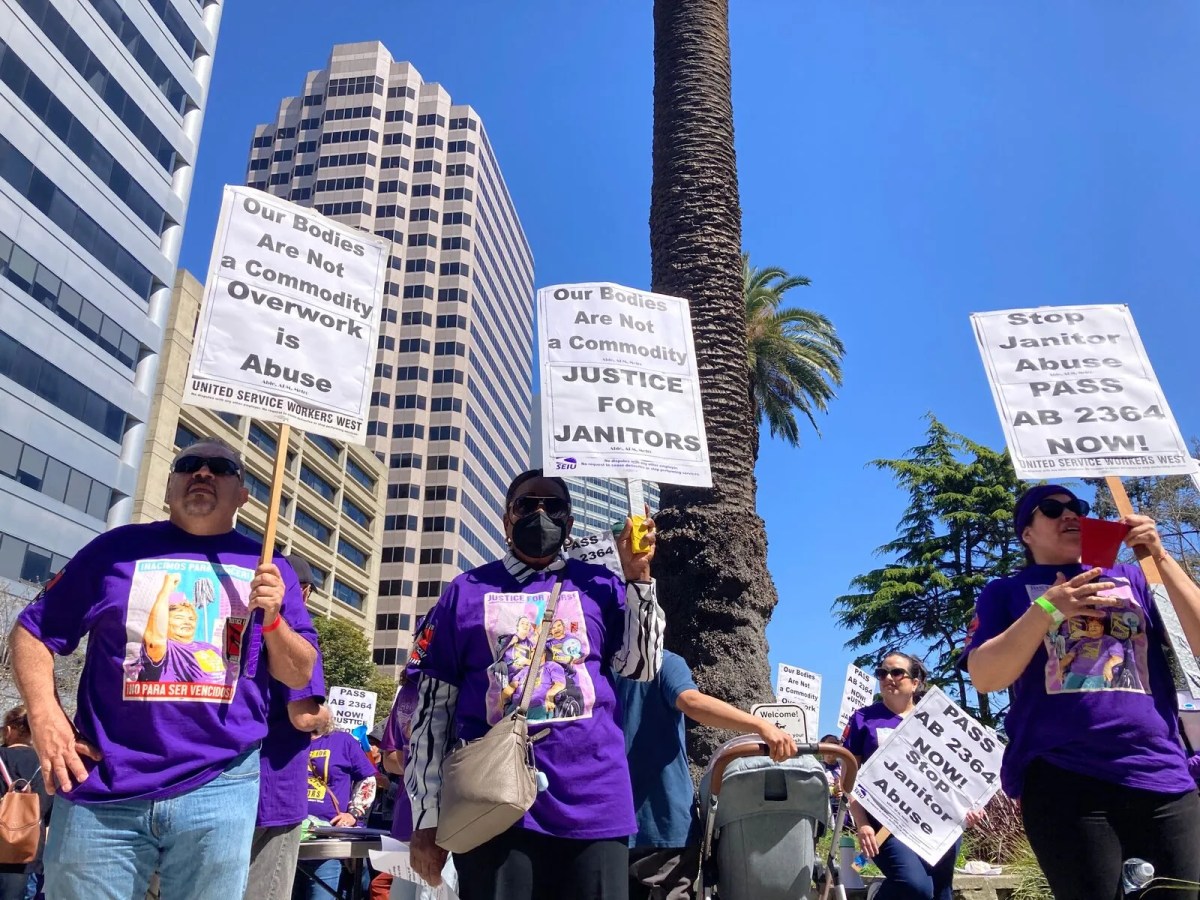Janitors who clean and maintain offices across the Bay Area say their industry has become more hazardous in recent years, leading to high rates of injury. At the same time, pay and benefits haven’t increased much, and harassment remains a problem.
Several hundred workers rallied and marched in downtown Oakland today calling on their employers to ease their workloads, and calling on Sacramento to pass legislation to address the issue.
Hilda Mosquera works at Tesla’s Fremont factory where she cleans the engineers’ offices five days a week from 2 p.m. to 10:30 p.m. When the pandemic began four years ago, she said the company and its subcontractors who employ janitors claimed there would be less need for janitorial staff due to remote work. But the workload has increased in recent years, according to Mosquera, and janitors like her are forced to work faster. This has caused an increase in injuries on the job.
Mosquera, who earns $15.50 an hour, suffered carpel tunnel in her hands from repetitive motions cleaning. She needed surgery but her employer doesn’t offer paid medical time off so she was forced to recover for one month without pay.
“It was very difficult,” she said about giving up her income for so long. “That’s the inequality we are facing.”
Tesla did not immediately respond to a request for comment. We will update this story if we hear back.

A recent state report found that California janitors have a “high burden of workload and negative health outcomes” because of the intensity of their jobs. One-third of janitors reported a workplace injury in 2022, and many reported severe pain, the need to take pain medications, missing work because of injuries, and anxiety and depression.
California’s janitorial workforce is majority women and many are immigrants. Since the early 1990s, this workforce has propelled California’s labor movement, starting with the Justice for Janitors campaign which launched in Los Angeles in 1990 and succeeded in gaining better pay and benefits for the city’s custodians.
Bay Area janitors are currently in contract talks with their employers, mostly maintenance and custodial companies that contract with the real estate firms that manage large office buildings, or big companies with their own campuses. The workers’ union, SEIU United Service Workers West, represents 45,000 janitors, security guards, and airport staff across the state.
In addition to better pay and benefits, the workers are backing a state bill that would limit workloads to what they say are less hazardous levels. Assembly Bill 2364, authored by Assemblymember Luz Rivas (San Fernando), would impose a limit on the building space a janitor could be required to clean during their shift—2,000 square feet per hour.
Building owners and janitorial companies are opposed to the law. BOMA Los Angeles, a group that represents large landlords and building operators, says the law would be “demanding and costly” because it would require property owners to hire many more janitors at a time when the commercial property industry is still reeling from office vacancies caused by the pandemic.
Janitors say harassment also remains a problem that they want employers to do more to address. A 2018 investigation by Frontline, “Rape on the Night Shift,” documented how women who clean commercial and office properties often experience harassment and some are victims of sexual assault. AB 2364 would strengthen anti-harassment workplace training requirements.
Mosquera said the overarching demand she and other workers have is for respect.
“Many of us are the breadwinners for our families. We do this work with love and dedication,” she said. “We give everything. We also need to be recognized economically.”

